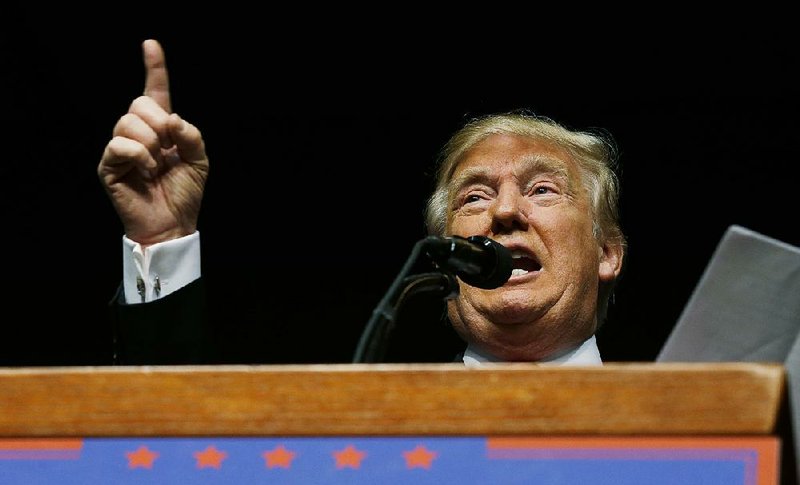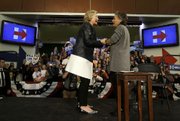WASHINGTON -- Efforts by disgruntled Republicans to organize a third-party challenge to presumptive presidential nominee Donald Trump face long odds and a ticking clock.
FULL ELECTION COVERAGE
Despite the odds, Republicans who feel that the unconventional and unpredictable Trump isn't a true conservative have ramped up discussions on trying to defeat him and Democratic presidential front-runner Hillary Clinton in November with an alternative candidate who hews more closely to their political beliefs.
"Why are we confined to these two terrible options?" Sen. Ben Sasse, R-Neb., wrote Wednesday in a lengthy Facebook post critical of Trump and Clinton. "Why shouldn't America draft an honest leader who will focus on 70 percent solutions for the next four years? You know -- an adult."
Republican anti-Trump forces are hunting for a willing candidate, seeking out potential donors, and mapping out legal strategies to navigate the many, often-stringent state rules and regulations to get a third-party candidate on the ballot.
"It's basically really, really late in the game to get onto the ballot," said Elaine Kamarck, founding director of the Center for Effective Management at the Brookings Institution. "Almost all of these states have signature requirements. Even if you hire professional, door-to-door types, you can't do this quickly. Imagine organizing 80,000 signatures. And they have to be real, living, registered voters."
Still, names of potential third-party candidates have been bandied about: Sasse; former Massachusetts governor and 2012 Republican presidential candidate Mitt Romney; former Texas Gov. Rick Perry; former Secretary of State Condoleezza Rice; former Sen. Tom Coburn, R-Okla.; retired Marine Corps Gen. James Mattis; and Republican Govs. Susana Martinez of New Mexico, Brian Sandoval of Nevada and Nikki Haley of South Carolina.
So far, no one is jumping at the chance to dive into the race. That's probably because no independent candidate has ever won the presidency, and some have gone down in history as spoilers.
Texas tycoon H. Ross Perot got 19 percent of the vote in his 1992 independent bid, which many say took votes away from incumbent Republican President George H.W. Bush and helped elect Democrat Bill Clinton.
Some Democrats blame consumer advocate Ralph Nader's independent run in 2000 for Vice President Al Gore's narrow loss to George W. Bush.
"It's an uphill climb -- everybody recognizes that, regardless of the route we go -- but there are a lot of Republican donors sitting on the sidelines who would rather fund a third party than fund Donald Trump," Erick Erickson, a conservative talk radio host and writer who's leading third-party conversations, told The Hill newspaper.
Trump and Republican National Committee officials dismiss the third-party quest as Washington cocktail conversation, a political pipe dream from party members who are unhappy now but will eventually return to the tent rather than face the prospect of a Hillary Clinton presidency.
"It's not going to happen," Sean Spicer, the committee's communication's director, said Thursday on CNN. "There is no organization, no funding mechanism, and frankly, there's no consensus candidate."
Then there's the rapidly narrowing window for getting a candidate on state ballots and getting the various wings of the party to agree on a consensus candidate at this late date.
For example, Monday is the deadline for an independent to file a declaration of candidacy in Texas. The application must be accompanied by a petition signed by at least 79,939 registered voters who didn't vote in the presidential primary of either party.
And the candidate must have a running mate picked -- the application requires signed consent from the candidate's vice presidential choice, according to the Texas secretary of state's website.
North Carolina has a June filing deadline and requires signatures of registered voters equal to 2 percent of the total number of voters who cast ballots in the most recent gubernatorial general election -- or 89,366 signatures.
A petition also must be signed by at least 200 registered voters from each of the state's 13 congressional districts.
The filing deadlines for independent and third-party candidates in Florida and South Carolina is July 15; Illinois; Missouri, Kansas and Pennsylvania, Aug. 1; California, Aug. 12; Kentucky and Mississippi, Sept. 9.
"The irony, of course, is that the major parties have always tried to find ways to close third parties out so it's particularly difficult to get on the ballot," said Daniel Franklin, associate political science professor at Georgia State University. "So they're kind of being hoisted by their own petard. It's very difficult for third parties to get on the ballot, particularly in Texas."
Sanders picks up delegates
On the campaign trail, Democratic presidential candidate Bernie Sanders cut into Clinton's lead by more than two dozen delegates, based on new data from Washington state, but his chances of winning the nomination were little improved. Clinton won the Guam caucus.
In Guam, the party said Clinton won 60 percent of the vote to earn four of the seven delegates at stake. Sanders, a senator from Vermont, will pick up three delegates.
The Pacific island is one of five U.S. territories that casts votes in primaries and caucuses to decide the nominee, even though those residents aren't eligible to vote in November. Often overlooked, Guam this election cycle drew attention from both the presidential candidates, who ran radio advertisements in a bid to scoop up any possible delegate in the final stretch of primaries and caucuses.
Combined with some delegate gains in Washington state, Clinton now has more than 93 percent of the 2,383 needed to clinch the nomination as she seeks to look ahead to a November matchup against Trump. Sanders has said he will take his delegate fight to the floor of the Democratic National Convention in Philadelphia in July.
In Washington state, Sanders won the caucus on March 26, when the Vermont senator won 25 of the 34 delegates awarded that day. An additional 67 district-level delegates could not be divided up until the state party could produce vote data broken down by congressional district.
District-level data provided Saturday to The Associated Press show that Sanders will pick up 49 of those delegates, while Clinton will receive 18.
The 67 district-level delegates from Washington had generated some debate on social media, where Sanders supporters questioned why he had not yet received any of those delegates in a state he won big. Like Iowa, Colorado and Maine, Washington state has a multistep process for awarding delegates to the national convention. It had said it could not immediately generate the more detailed information until its county conventions were complete May 1.
Meanwhile, at Maine's state convention on Saturday, party officials said Sanders ultimately gained one additional delegate -- and Clinton lost one -- after he picked up additional support from the state's March 6 caucus.
Still, even with the additional delegates for Sanders, his mathematical chances of winning the nomination haven't improved.
Based on primaries and caucuses to date, Clinton has 1,705 delegates while Sanders has 1,415 -- or a lead for Clinton of 290 delegates, according to the AP.
If he hopes to overtake her based on just those primary and caucus delegates, he still must win 66 percent of the remaining delegates -- a figure unchanged from before.
Clinton's lead is bigger when including superdelegates -- party officials who can support any candidate.
She has a total of 2,228 delegates, while Sanders has 1,454 when including superdelegates.
Trump, meanwhile, again raised former President Bill Clinton's marital infidelities, suggesting he plans to use the attack to respond to general-election attacks from Hillary Clinton and her allies about his treatment of women.
Speaking at a rally Saturday in Spokane, Wash., Trump repeatedly assailed the woman he's dubbed "Crooked Hillary" while hardly sparing former Republican rivals repulsed by his chokehold on their party's presidential nomination.
"She's married to a man who was the worst abuser of women in the history of politics," Trump said of Clinton as he addressed supporters at the Spokane Convention Center just days after becoming the presumptive Republican nominee. Trump was referring specifically to Bill Clinton's affair with a White House intern during his presidency.
Trump appeared to be responding to news that Priorities USA, the lead super political action committee backing Hillary Clinton, has already reserved $91 million in television advertising that will start next month. Much of the negative advertising against Trump is expected to focus on belittling statements he's made about women in the past.
But Trump declared Saturday, "Two can play that game."
Information for this article was contributed by William Douglas of Tribune News Service and by Hope Yen, Erica Werner, Steve Peoples, Julie Bykowicz and Jill Colvin of The Associated Press.
A Section on 05/08/2016


